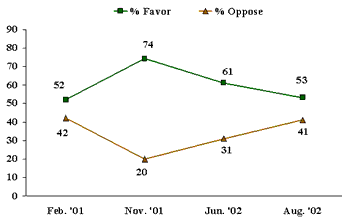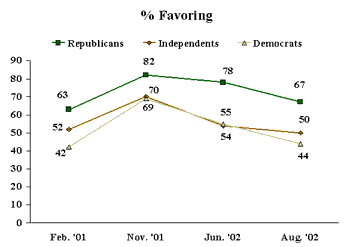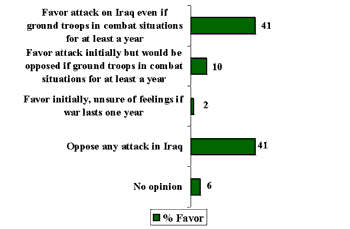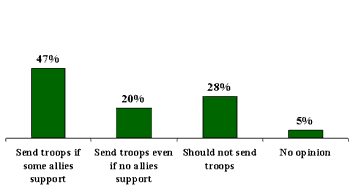GALLUP NEWS SERVICE
PRINCETON, NJ -- The aftermath of the 9/11 terrorist attacks last year witnessed a dramatic surge in public support for the United States to attack Iraq in order to oust Saddam Hussein from power. But the most recent CNN/USA Today/Gallup poll finds that the public is more conflicted now over such a military effort. A bare majority of Americans, 53%, say they would favor sending American ground troops to the Persian Gulf area in an attempt to remove Hussein from power, while 41% say they would oppose such action.
| Would you favor or oppose sending American ground troops to the Persian Gulf in an attempt to remove Saddam Hussein from power in Iraq? |
 |
The current results are similar to those measured by Gallup in February of last year, when 52% favored and 42% opposed military action against Iraq. Shortly after the 9/11 attacks, a Gallup poll found that support had jumped to 74%, with just 20% of Americans opposed. By this past June, support had fallen to the 61% level, and opposition had risen to 31%. The most recent readings were taken after two prominent Republicans, Representative Dick Armey, House majority leader, and Brent Scowcroft, national security adviser in the first Bush administration, had publicly expressed strong reservations about reported plans by the current Bush administration to attack Iraq.
An analysis of the results by party affiliation shows that after the 9/11 terrorist attacks, support for military action against Iraq surged among Republicans, independents and Democrats about equally, and that support has recently fallen off at roughly the same rate among the three groups. Typically, Republicans support the effort by a little over 20 percentage points more than Democrats, with independents closer to the Democratic than the Republican position. In November, however, the gap between Republicans and Democrats narrowed to 13 percentage points. Currently, the difference in support between the two parties is 23 points.
| Would you favor or oppose sending American ground troops to the Persian Gulf in an attempt to remove Saddam Hussein from power in Iraq? |
 |
Support Lower for Extended War
The poll also shows that public support for a war against Iraq could shift substantially if the war requires a year or more of extensive fighting. About one in five of all supporters, or 10% of Americans overall, say they would oppose a war if that meant the United States "would have a significant number of ground troops in combat situations for at least a year." Thus, opposition to the war would increase to 51%, while 41% of Americans say they would favor the extended war effort. The rest are unsure.
| Support for Attacking Iraq Depends Somewhat on Duration of War |
 |
| Aug. 19-21, 2002 |
Americans would also be less likely to support a war against Iraq if allies of the United States refused to support the effort. The poll shows that just 20% of Americans say the United States should send troops even if no allies support doing so.
| Which comes closer to your view about the circumstances under which the U.S. should send ground troops into Iraq -- the U.S. should send troops if at least some of our Western allies support that action, the U.S. should send troops even if none of our Western allies support that action, or the U.S. should not send troops? |
 |
| Aug. 19-21, 2002 |
Most Americans Believe Hussein Supports Terrorism
Whatever their feelings about attacking Iraq, most Americans -- 86% -- believe Hussein is involved in supporting terrorist groups that have plans to attack the United States. But Americans are less certain that the Iraqi leader was himself personally involved in the 9/11 terrorist attacks: 53% believe he was, while 34% say he was not, and another 13% have no opinion.
Do you think Saddam Hussein is involved in supporting terrorist groups that have plans to attack the United States, or not?
|
Yes, is involved |
No, is not |
No opinion |
|
|
2002 Aug 19-21 |
86% |
8 |
6 |
Do you think Saddam Hussein was personally involved in the September 11th terrorist attacks, or not?
|
Yes, was involved |
No, was not |
No opinion |
|
|
2002 Aug 19-21 |
53% |
34 |
13 |
More than nine in 10 Americans also believe that Hussein either has already developed weapons of mass destruction or is trying to develop them. And among these people, more than eight in 10 believe that once he has such weapons, he would use them against the United States.
Do you think Iraq currently has weapons of mass destruction, is trying to develop these weapons but does not currently have them, or is not trying to develop weapons of mass destruction?
|
Currently |
Is trying |
Is not trying |
No |
||
|
2002 Aug 19-21 |
55% |
39 |
1 |
5 |
|
|
2002 Feb 8-10 ^ |
55% |
40 |
2 |
3 |
|
|
^ |
WORDING: Do you think -- [RANDOM ORDER: Iran, Iraq, North Korea] -- currently has weapons of mass destruction, is trying to develop these weapons but does not currently have them, or is not trying to develop weapons of mass destruction? |
||||
Do you think Saddam Hussein would use those weapons of mass destruction to attack the United States, or not?
BASED ON -- 746 -- ADULTS WHO SAY IRAQ CURRENTLY HAS WEAPONS OF MASS DESTRUCTION OR IS TRYING TO DEVELOP WEAPONS
|
Yes, would use |
No, would not |
No opinion |
|
|
2002 Aug 19-21 |
83% |
15 |
2 |
When asked which political party in Congress would be more likely to make the right decision regarding Iraq, Americans choose the Republicans over the Democrats by 41% to 30%, with another 29% not making a choice between the two parties on this issue.
When it comes to Congress, who do you think is more likely to make the right decisions regarding Iraq -- [ROTATED: the Republicans in Congress, (or) the Democrats in Congress]?
|
|
|
Neither |
Same |
No |
|
|
2002 Aug 19-21 |
41% |
30 |
7 |
10 |
12 |
As for whether the United States will actually be at war with Iraq by the end of the year, Americans are evenly divided, with 45% saying yes and an equal number saying no. An additional 10% have no opinion. There are no significant differences among the three partisan groups on this matter.
Do you think the United States will -- or will not -- be at war with Iraq by the end of the year?
|
Yes, will be |
No, will not be |
No opinion |
|
|
2002 Aug 19-21 |
45% |
45 |
10 |
Survey Methods
The latest results are based on telephone interviews with 801 national adults, aged 18+, conducted Aug. 19-21, 2002. For results based on the total sample of national adults, one can say with 95% confidence that the margin of sampling error is ±4 percentage points. In addition to sampling error, question wording and practical difficulties in conducting surveys can introduce error or bias into the findings of public opinion polls.